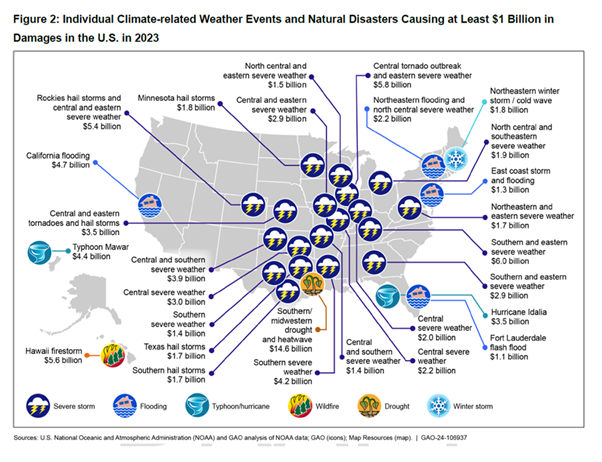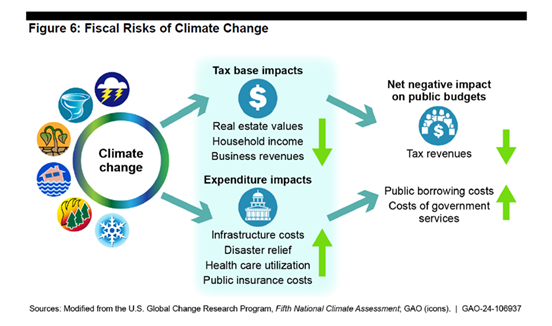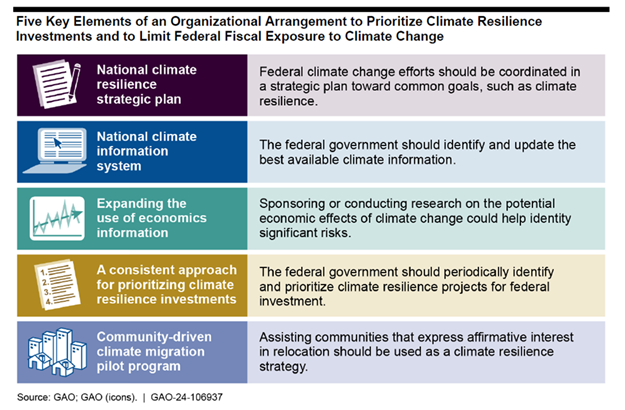Cantwell, Collins Release GAO Report Revealing Federal Government is Ill-Equipped to Handle Cost of Climate Change
Conservative estimates find climate impacts will cost federal government many trillions of dollars
WASHINGTON, D.C. – Today, the U.S. Government Accountability Office (GAO) published a new report requested by Senator Maria Cantwell (D-WA), Chair of the Senate Committee on Commerce, Science, and Transportation, and Senator Susan Collins (R-ME), Vice Chair of the Senate Committee on Appropriations, on the economic impacts of climate change to the federal government.
The report, titled Climate Resilience: Congressional Action Needed to Enhance Climate Economics Information and to Limit Federal Fiscal Exposure, warns that “Available estimates indicate significant projected costs to the economy and the federal government as a result of climate change,” and that “the federal government is currently not well-organized to manage this reality.”
“This bipartisan request to GAO to ask how much taxpayers are at risk has revealed we have big exposure. We already know we are being buffeted by more frequent wildfires, shrinking snowpacks, coastal erosion, and harmful ocean acidification. This report makes clear that Congress should act to limit the U.S. government’s alarming fiscal exposure due to the intensifying impacts of climate change,” Sen. Cantwell said.
“In Maine, our economy is inextricably linked to the environment. From rising sea levels to warming waters to damaging storms, the impacts of climate change are already threatening our working waterfronts and coastal communities,” said Sen. Collins. “This nonpartisan GAO report Senator Cantwell and I requested contains astonishing numbers about the cost of climate-related weather events to the federal government. These findings support the need for a coordinated plan by the federal government to increase climate resiliency efforts and improve reporting of climate-related financial risks.”
After reviewing agency documents, conducting literature reviews, and interviewing government experts, the GAO discovered that federal agencies currently have little capacity to analyze or report climate-related risks, making it difficult to evaluate potential climate resilience actions or investments the U.S. government could take to lessen future damages and ultimately save taxpayers money.
GAO’s work on costs to the federal government follows eye-opening analysis last November in the Fifth National Climate Assessment that found the cost of climate damages to the entire U.S. economy from extreme weather events is already $1.5 trillion per decade. This number is a conservative estimate that does not account for loss of life, health care-related costs, or damages to ecosystem services noted the authors, which include federal science agencies whose assessment was reviewed by external experts and required by statute.
GAO’s report identified six key sectors of great financial risk to the federal government due to the projected impacts of climate change: crop insurance, coastal disaster relief, health care expenditures, wildland fire suppression, flood insurance, and sea level rise. By synthesizing scientific and economic analysis across different government and private-sector sources, GAO reported that changes in the first four sectors would cost the federal government an estimated $18 billion annually by midcentury and nearly $69 billion annually by late century. Payouts for flood insurance are estimated to increase by nearly $4 billion per year by 2050, and hurricanes alone are projected to reduce America’s balance sheet by $36 billion per year by 2050 in a high emissions future.

Additionally, there are more than 160,000 federal buildings in a current 500-year flood plain valued at over $490 billion that are at ever increasing risk of flooding due to climate change, while damages to federal facilities due to sea level rise may be even worse. GAO noted that these sectors are not comprehensive and climate change has many other significant impacts, including falling tax revenues due to decreased real estate values, household income, and business revenues.


This report builds on an October 2017 GAO report requested by Senators Cantwell and Collins on the costs of climate change to the federal government.
The full 2024 GAO report can be found HERE.
Next Article Previous Article